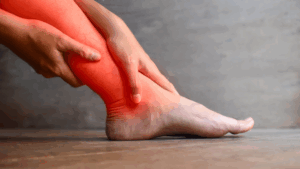At Chiropractic Singapore, we know how disruptive a pinched nerve can be. Whether it develops in your lower back, neck, or shoulder, nerve compression can cause pain, stiffness, tingling, and weakness that limit your ability to work, exercise, sleep, and enjoy daily life. Our focus is on providing safe, natural, and non-invasive chiropractic care to reduce pressure on the nerves, restore balance to the spine, and support your body’s natural healing process.
What Is a Pinched Nerve?
A pinched nerve occurs when surrounding tissues — such as bones, muscles, ligaments, tendons, or spinal discs — press too hard on a nerve. This compression interferes with normal nerve signalling, which may cause discomfort, weakness, or changes in sensation.
Pinched nerves may happen suddenly, for example, after an injury. But more often, they develop gradually due to posture issues, repetitive movements, spinal misalignments, age-related disc changes, or even muscle tightness. Over time, this pressure can create irritation that affects not only the nerve itself but also the muscles and organs it communicates with.
Recognising Pinched Nerve Symptoms
Early recognition of pinched nerve symptoms is important for seeking the right care. Symptoms can differ depending on where the nerve is compressed, but these are the most common:
Pinched Nerve Causes Radiating Pain
A pinched nerve often causes sharp, shooting, or burning pain that spreads away from the source. In the lower back, this pain may travel down into the legs — commonly known as sciatica. In the neck, the pain may radiate into the shoulders, arms, or even the hands. This type of pain can feel sudden and intense, especially with certain movements.
Pinched Nerve Causes Tingling or Numbness
Many people experience a “pins and needles” sensation or areas of reduced feeling. This tingling or numbness may come and go or remain constant, depending on the severity of the compression. It often affects the arms, hands, legs, or feet, making everyday tasks such as typing, walking, or holding objects more difficult.
In some cases, this irritation of the nerve root in the lower spine may extend down the leg — a condition commonly known as sciatica. This can cause sharp pain, weakness, or persistent tingling that travels from the lower back through the buttock and down the leg, further affecting mobility and quality of life.

Pinched Nerve Causes Muscle Weakness
When nerves are compressed for a prolonged period, they may affect muscle strength. You might notice difficulty gripping items, lifting objects, or even walking steadily. Muscle weakness not only interferes with daily activities but can also increase the risk of falls or injuries if left unaddressed.
Pinched Nerve Causes Night Discomfort
Pinched nerve pain often becomes worse at night, making it difficult to find a comfortable sleeping position. Pain may increase when lying down or staying in one posture for too long, leading to restless nights and poor sleep quality. This can further contribute to fatigue and slow down recovery.
Common Areas Affected by a Pinched Nerve
A pinched nerve can occur in different regions of the body, depending on which part of the spine or surrounding structures are placing pressure on the nerve. The most frequently affected areas include the lower back, neck, and shoulder. Each of these presents its own challenges, symptoms, and triggers — but they all share the common issue of disrupted nerve function. Recognising the differences is key to getting the right care.
Pinched Nerve in Lower Back
A pinched nerve in the lower back is one of the most common types of nerve compression. The lumbar spine supports much of the body’s weight, and when spinal discs or vertebrae press on nerves, it can lead to conditions such as sciatica.

Common triggers:
- Herniated or bulging discs.
- Misalignments in the lumbar spine.
- Prolonged sitting or poor lifting techniques.
Chiropractic adjustments aim to restore spinal alignment, reduce nerve compression, and improve mobility in the lumbar spine, helping people move more comfortably.
Pinched Nerve in Neck
A pinched nerve in the neck (cervical spine) often creates discomfort that radiates into the shoulders, arms, and hands. Because the cervical region houses delicate nerves that supply the upper body, compression here can affect both comfort and function.

Common triggers:
- Forward head posture from extended device use.
- Degenerative disc changes or arthritis.
- Sudden injuries such as whiplash.
Gentle chiropractic care for the cervical spine helps relieve compression, improve posture, and restore better range of motion.
Pinched Nerve in Shoulder
A pinched nerve in the shoulder may mimic muscle strain, but the true cause often lies in nerve compression.

Common triggers:
- Spinal misalignments affecting nerve pathways.
- Repetitive strain or overuse injuries.
- Poor posture and rounded shoulders.
Chiropractic care seeks to address these imbalances and reduce nerve pressure, allowing the shoulder to function more effectively.
Pinched Nerve in Arm and Hand
A pinched nerve in the arm or hand can make even simple activities such as writing, typing, or carrying objects uncomfortable. Nerve compression in the cervical spine, shoulder, or elbow can cause symptoms that radiate down into the arm and fingers.

Common triggers:
- Nerve irritation in the neck radiating down the arm.
- Compression at the shoulder or elbow.
- Repetitive motions such as typing or manual work.
Chiropractic adjustments and postural correction target the root source of the compression, helping restore healthy nerve communication into the arm and hand.
Pinched Nerve in Leg
A pinched nerve in the leg often stems from compression in the lower back, most commonly affecting the sciatic nerve. This condition, known as sciatica, can create discomfort that extends from the lower back through the buttocks, thigh, and all the way down to the foot.

Common triggers:
- Lumbar disc herniation or bulging discs.
- Poor spinal alignment.
- Prolonged sitting or repetitive strain.
Chiropractic adjustments aim to reduce lumbar nerve compression, restore spinal health, and improve function in the legs.
Pinched Nerve Treatment in Singapore: Options Available
There are several approaches to pinched nerve treatment. Some provide temporary relief, while others focus on long-term correction and prevention.
| Pinched Nerve Treatment Options | What It Involves | Considerations |
|---|---|---|
| Medication for Pinched Nerve | Painkillers, muscle relaxants, or anti-inflammatory drugs prescribed by a doctor. | Can ease pain temporarily, but doesn’t address the root cause. Long-term use may lead to side effects. |
| Physiotherapy for Pinched Nerve | Guided exercises, stretches, and physical modalities such as ultrasound or heat therapy. | Strengthens muscles, improves mobility, but requires consistent attendance and effort. |
| Surgery (for severe cases) for Pinched Nerve | Procedures such as discectomy or decompression to relieve nerve pressure. | Usually a last resort when conservative care has failed. Involves risks, higher costs, and longer recovery. |
| Chiropractic Care for Pinched Nerve | Gentle spinal adjustments, postural correction, lifestyle guidance, and tailored care plans. | Non-invasive, drug-free, and aims to address the root cause by restoring spinal alignment and reducing compression. |
Chiropractic Care for for Pinched Nerve at Chiropractic Singapore
Chiropractic care is centred on natural, corrective solutions that address the underlying cause of a pinched nerve. Care plans may include:
- Spinal adjustments – gentle, precise techniques to restore proper spinal alignment, ease pressure, and reduce nerve irritation.
-
Corrective postural guidance – practical advice on how to sit, stand, and move to minimise daily strain on the spine and nerves.
-
Lifestyle and ergonomic support – recommendations for workstation set-up, sleeping positions, and everyday habits that protect spinal health.
-
Therapeutic exercises and stretches – customised movements that build flexibility, strengthen supporting muscles, and help prevent recurrence.
-
Ongoing monitoring and support – personalised progress checks to track improvements, adapt care as needed, and ensure long-term results.
This holistic approach goes beyond pain relief, focusing on restoring healthy nerve communication, preventing recurrence, and supporting long-term spinal wellness.
Can I Run with a Pinched Nerve in My Neck?
A common question we hear is: “Can I run with a pinched nerve in my neck?”
While running isn’t always unsafe, it may aggravate the condition if the underlying compression isn’t resolved. The repetitive impact of running can increase irritation in the neck and shoulders.
Before returning to running or other high-impact sports:
- Have your condition properly assessed.
- Follow a care plan that supports spinal alignment.
- Consider switching to lower-impact activities such as swimming, cycling, or brisk walking until healing progresses.
With chiropractic adjustments, many people find they are able to return to their activities more comfortably and confidently.
Taking the Next Step for Pinched Nerve Relief
Living with a pinched nerve can feel limiting, but it doesn’t have to control your life. If you’re noticing ongoing pinched nerve symptoms in your lower back, neck, or shoulder, chiropractic care offers a natural, supportive approach to managing discomfort and improving spinal health.
At Chiropractic Singapore, we are committed to personalised care that helps you move better, feel better, and live better. Our team will work with you to identify the underlying cause of your symptoms and provide safe, non-invasive strategies tailored to your needs.
Take the first step towards relief — book your consultation with Chiropractic Singapore today and let us support you in restoring balance and improving your quality of life.
Frequently Asked Questions About Pinched Nerve
1. How long does a pinched nerve take to heal?
It varies. Some improve within days or weeks, while others require longer-term care depending on lifestyle, posture, and the severity of compression.
2. Is a pinched nerve permanent?
Often it is temporary. Once the pressure is relieved, symptoms usually improve. But if left untreated, chronic nerve damage is possible.
3. Can stress cause a pinched nerve?
Not directly, but stress can increase muscle tension and poor posture, which may contribute to nerve compression.
4. What should I avoid if I have a pinched nerve?
Avoid activities that worsen discomfort, such as heavy lifting, awkward postures, or repetitive strain. Focus on supportive habits, good ergonomics, and gentle movement.
5. Can a pinched nerve go away on its own?
Sometimes. Mild cases may resolve naturally with rest and posture correction. Persistent or worsening symptoms should be professionally assessed.
6. Do pinched nerves only occur in the spine?
No. While spinal nerves are commonly affected, pinched nerves can also occur in the wrist (carpal tunnel), elbow, or other joints.









